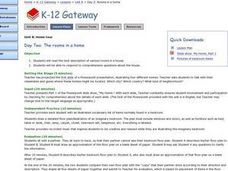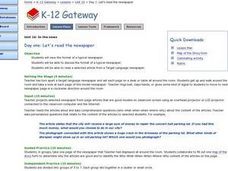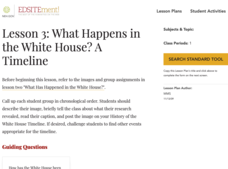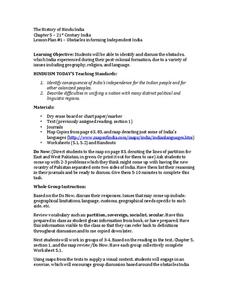Ogden Museum of Art Education Department
Literacy and Landscapes
As the saying goes, art often imitates life ... and literature! A series of activities designed to accompany a visit to the Ogden Museum of Southern Art encourage writers to find inspiration in various landscapes. The lesson includes a...
Fluence Learning
Writing an Opinion: Is Pride Good or Bad?
Does pride really goeth before the fall, or can it be essential to one's development? Second graders read two of Aesop's fables that refer to pride in their morals, and write a short essay about whether pride is good or bad, based on...
PBS
Stories of Painkiller Addiction: Prescription Drug Abuse Awareness Campaign
The I-STOP law was designed to regulate the distribution and tracking of prescription drugs. After reading an article about its signing and implementation, middle and high schoolers work together to come up with their own ideas for an...
Calvin Crest Outdoor School
Survival
Equip young campers with important survival knowledge with a set of engaging lessons. Teammates work together to complete three outdoor activities, which include building a shelter, starting a campfire, and finding directions in the...
American Museum of Natural History
Make Your Own Paper
Paper, paper everywhere. Paper is so prolific that few think about where the idea for it originated and how it is made. Introduce young readers to the paper-making process with an activity that lets them create their own.
Fluence Learning
Writing an Argument: Is Electronic Communication Helpful or Harmful?
Technology has undoubtedly improved the lives of people around the world—but has it improved communication? Seventh graders read two informative passages about the rise of texting and emailing versus in-person conversations before...
Fluence Learning
Writing About Literature: Nature in the Writings of John Muir and Emily Dickinson
As an assessment of their skill in crafting a compare and contrast essay, class members read and compare the portrayals of nature in excerpts from naturalist John Muir's My First Summer in the Sierra and from poet Emily Dickinson's "The...
Houghton Mifflin Harcourt
Nineteen Eighty-Four George Orwell
The depth of Nineteen Eighty Four is in the details. Encourage a close reading of Orwell's dystopian classic with resource sheets that focus attention on the author's stylistic choices that lead to the betrayals that make Big Brother's...
Baylor College
Needs of Living Things: Post-Assessment
Assess your class's knowledge of the needs of living things with the final instructional activity in a series. Given a large piece of paper and coloring utensils, young scientists draw a picture of themselves and a plant or animal of...
Baylor College
Post-Assessment: Global Atmospheric Change
Find out how much your earth scientists learned about the atmosphere in the unit on global atmospheric change with this assessment. After writing a letter to persuade others to make changes to protect our atmosphere, pupils take the same...
Conneticut Department of Education
Instructional Strategies That Facilitate Learning Across Content Areas
Imagine 28 instructional strategies, appropriate for all subject areas and all grade levels. Directed Reading-Thinking Activities (DRTA), Question-Answer Relationship (QAR) activities, KWL charts, comparison matrixes, classification...
Curated OER
Newberry Award Reading Project
Fifth graders complete a project for a Newberry Award winning book. This ambitious lesson outlines the expectations for students regarding their project. Included is a list of possible books and a variety of writing, art, music and...
Curated OER
The Rooms in a Home
Enhance your foreign language students' skills to describe a house. After reading a description of rooms in a house in their target language, they work to answer corresponding questions correctly. Additionally, they view a PowerPoint...
Poetry Society
A Conceit Poem
Young writers needn't be self-involved to craft a conceit. Directions for how to craft this form of extended metaphor, models, and a worksheet are all included in the packet.
Curated OER
Irregular Word Fluency, Word Baseball
Students review irregular words and build fluency by playing a game. In this irregular word lesson plan, students label a variety of blank index cards, then post the index cards around the room as signs that create a diamond shape....
Curated OER
Let's Read the Newspaper
Students investigate the format of a typical newspaper. In this journalism lesson, students read a newspaper from a target language and discover the vocabulary associated with the news. Students work together as a newspaper group each...
Novelinks
The House on Mango Street: Anticipation Guide
Prior to an in-class reading of "What Sally Said" and"Red Clowns," two vignettes from Sandra Cisneros' The House on Mango Street, class members complete an anticipation guide that asks them to agree or disagree with a series of...
CHPCS
The United States in the 1920s: The New Negro Movement and the Harlem Renaissance
Music, writing, and activism all tell the story of history! The resource uses these elements and more in a presentation to discuss the Jazz Age and Harlem Renaissance. Your class views biographies, discusses important events, and...
Curated OER
Back to the Past
What was the Untied States like in 1938? What were the concerns of Americans in the post World War I era? What were their fears? What were their sources of news and entertainment? To understand the reaction to Orson Welles' radio...
National Endowment for the Humanities
Lesson 3: What Happens in the White House? A Timeline
Working in groups or individually, learners study images of important events that occurred at, or directly affected, the White House, and share their findings of a specific event. They then post the image of their event on a timeline of...
Kauai's Hindu Monastery
The History of Hindu India
What obstacles did India face during their post-colonial formation after gaining independence? Topics discussed in the lesson include Pakistan's conflict over Kashmir, the Indian Constitution, economic development, and the influence of...
Bantam Books
The Tempest: Chalk Talk
Discussion doesn't always need to be spoken. Before you begin The Tempest by William Shakespeare, have kids connect their ideas and experiences to central questions of the play with a silent discussion activity. Once they have...
PBS
The Diary of Anne Frank
While designed to supplement a viewing of the PBS Masterpiece Classic The Diary of Anne Frank, this resource can also serve as an excellent informational text and activity source for your students on the historical context and timeline...
Science Matters
Potential and Kinetic Energy
Everything has potential energy; learning to use it is the key to understanding all types of energy. Scholars learn the difference between kinetic and potential energy. They then apply the concept to drawing examples of both types of...

























